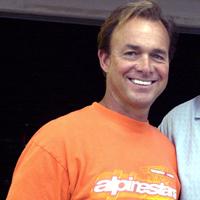|
||||||||||||||
|
He was just a kid... a teenager, with the long hair worn by all those California kids at the time. And that time was the early 70s.
Young Marty Smith was a local racer, just starting to get fast, when somebody from Honda saw something special
Almost before he realized what happened, he was sponsored by Honda, a relationship that lasted a long, long time and yielded a bunch of titles. Marty started out riding with his Dad on a little step-thru Honda 50. Dad and his friends used to go out to desert to trail ride on their 50s, and one day, they picked Marty up and put him on the pegs, gave a little shove and sent him on his way. Marty was so small then, there was no way he could reach the ground, so he rode on the pegs standing up the whole time. Marty is convinced that this early riding technique gave him the foundation for his smooth style. After fun riding for a few years and moving up to bigger bikes, he got the urge to try his hand at racing. His parents took him to the legendary Carlsbad motocross track and signed him up. Marty watched the racer practicing and asked his parents if he had to race because they had already signed him up. Smiling, they said it was all up to him. He went over, leaned against the fence for a long while and said: "Well, they don't look fast enough to run over me, so I think I'll race." He got a fifth in that first effort. And that was the start. Marty became a regular at the local tracks and started winning races on a regular basis. During this learning curve, he had no teachers and learned more by carefully observing the fast guys, then applying what he saw. His riding style stayed smooth and he rarely crashed. In fact, as Marty will tell you ... "I almost never raced 100 percent. I always wanted to be in control and during my career, this approach kept me from a lot of the injuries that most motocrossers encounter." The relationship with Honda was close to ideal. With huge enthusiasm, he'll tell you about the bikes that came from the factory: "They were often incredible! We'd take one out of the crate for testing and it would be perfect. I'd go out and win with it right away!" Over the glory years with Honda, Marty had more than his share of battles with a skinny kid they called the Hurricane. Hurricane Hannah, to be exact. On Bob Hannah: "He was tough ... maybe the toughest I ever raced against. When he was on, nobody could touch him." More on Hannah: "Sometimes when I would race against Bob, his feet would be in the air like one of these freestyle guys you see today. But Bob wasn't doing any trick. That was just how he rode! Me, I was the exact opposite. I always rode under control." A three-time National Champion, Marty desperately wanted to win the 500 title in 1977, especially when he was smarting from a defeat in the 250 National title chase from Bob Hannah. During that season, Hannah was erratic with a brilliant ride followed by a mediocre one. Marty, on the other hand, was consistent and finished well in every moto of every race. With only one race to go, Hannah had a slim three-point edge over Marty and the stage was set for a classic confrontation, but Hannah had a throttle cable failure after taking an early lead. At times during the early years in his career, he was such a teen idol that women would literally pursue him. There would be knocks on hotel doors at night, giggling autograph seekers giving him big hugs and outrageous flirting was more common than berms. This presented some strange situations when Marty got married ... but he managed to emerge unscathed, and 24 years later, is still married to wife Nancy. Marty was with Honda most of his career. It was only after he crashed at the Houston Astrodome during a supercross and had a badly dislocated hip, that he decided to retire. However, he received a two-year offer from Suzuki and the money was good, so he figured he'd give it a shot. So for 1981 and 1982, he was on a big factory RM. But his heart wasn't really in it. At this point, Marty knew he was simply going through the motions. He took a deep breath and walked away from professional racing. Any regrets? No. Marty will look you right in the eye and tell you that the years when he was on top were great, and he wouldn't have traded them for anything in the world, but his time has passed. And ... he's comfortable with it. Interesting thing, however. When we watched Marty ride with his students during one of his motocross schools, he looked as fast ands smooth as ever. Would he consider racing again? He shook his head, and amazingly, smiled when he answered that he was not willing to do the intensive training required to race and win. "Racing is one thing: going at the level needed to win would take an incredible amount of time and energy in training and preparation. I'm not willing to commit to that. Again." |
||||||||||||||
Follow @Off-Road














 Your Privacy Choices
Your Privacy Choices